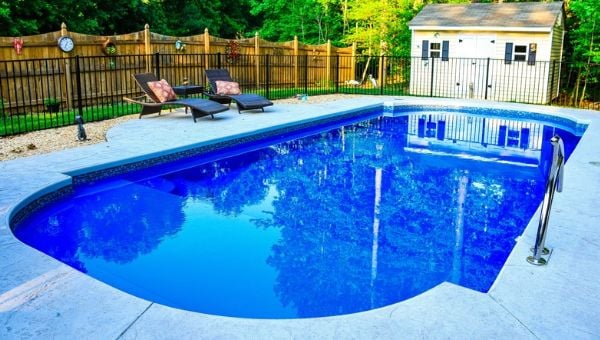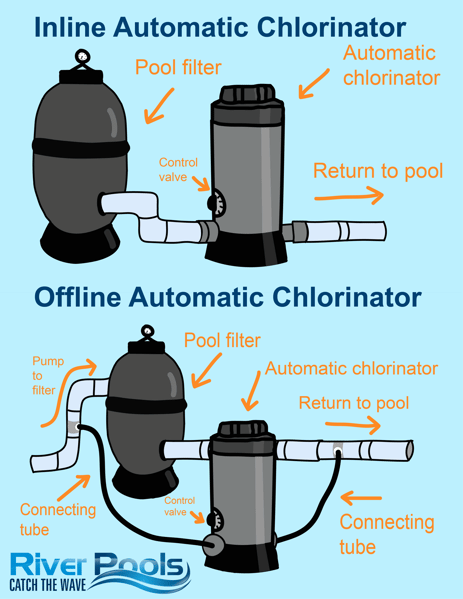
What Is an Automatic Pool Chlorinator? Cost, Types, Pros, and Cons
Keeping your pool clean is extremely important, but, let’s face it, it’s also a chore.
Since we at River Pools are in the business of manufacturing and installing fiberglass pools, we know first hand how much work caring for a swimming pool can be. Most people have one swimming pool in their yard...we have four.
Luckily, there are a few robots that can help out.
Aside from robotic pool cleaners, you’ll have a few other friends on your side. One handy sidekick is the automatic pool chlorinator.
In this article, we’ll explore types of automatic pool chlorinators, the cost to buy one, how long they last, and much more. We hope that by the end you’ll have a good understanding as to whether an automatic chlorinator is a worthy investment for you.
What is an Automatic Pool Chlorinator?
An automatic pool chlorinator is a piece of equipment that automatically dispenses chlorine into your pool. Rather than putting the chlorine directly into your pool using a floating chlorinator or by pouring in liquid chlorine, you would place it into your automatic chlorinator and allow it to dispense at your set rate.
We want to make it clear that this article will focus on automatic chlorinators and not chlorine generators. If you’re researching salt chlorinators or salt chlorine generators, read our full guide on those here.
How Does an Automatic Pool Chlorinator Work?
An automatic pool chlorinator plugs directly into your pump and filter system and sanitizes the water returning to the pool. Rather than placing the chlorine directly in the pool in a floating chlorinator, for example, an automatic chlorinator dispenses chlorine steadily from outside the pool.
Note: If you have an above ground pool or want to get an above ground pool, make sure that the pool chlorinator that you buy can be used on an above ground pool. Some automatic chlorinators can be used for both and others are more specific to inground or above ground pools.
Pool Volume
Automatic chlorinators will work with pools of varying volumes, depending on the chlorinator and your configuration. For example, some automatic pool chlorinators will sanitize pools of up to 40,000 gallons (a pool that holds 40,000 gallons may be about 12ft. by 40ft. and up to 8 feet deep).
While many pool chlorinators can handle larger pools, others are designed for smaller pools, so be sure to check this part before you buy.
Don’t know how many gallons are in your pool? Here’s how you would find out.
Start by multiplying the length of your pool by the width to get the surface area. Then find the average depth by adding the shallowest depth to the deepest depth and dividing that number by two. Your final formula to figure out approximately how many gallons of water your pool holds would look like this:
Surface area X Average depth X 7.5
What Type of Chlorine Does an Automatic Chlorinator Use?
As we discussed in our article on pool sanitation, chlorine comes in 4 forms: tablet, granule or powder, liquid, and gas. Your automatic chlorinator will most likely work with dissolvable pool chlorine tablets or sticks, like Trichlor tablets.
Types of Automatic Chlorinators
Inline vs Offline Chlorinator
If you’ve been shopping around for a swimming pool chlorinator, you’ve probably noticed that you have two options: inline and offline chlorinators. They both function the same and cost about the same, too (most fall within the $35 and $95 price range).
The main difference lies in how they are installed. The inline chlorinator is installed directly into the piping that’s connected to your pump and filter system. The offline chlorinator is installed on the side of the system and connected with a tube. You’ll probably find that certain pool chlorinators can be adapted to work either way.
See the diagram below to better understand the differences between inline and offline chlorinators:

What’s the Difference Between an Automatic Pool Chlorinator and an Automatic Chemical Feeder?
These are two different names for similar pieces of equipment. Chemical feeders usually work with either chlorine or bromine tablets while chlorinators are specifically made for chlorine (and brominators are made for bromine).
Keep in mind that automatic chlorinators and automatic chemical feeders work with different size tablets or sticks, depending on what the instructions require.
Automatic Pool Chlorinator Pros and Cons
While automatic chlorinators have a lot of advantages, there are also a few disadvantages to consider. Here’s our list of pros and cons to give you a full overview of what you can expect from an automatic pool chlorinator:
Pros
- Works automatically, even when you’re away from home or out of town
- Keeps chlorine tablets out of your swimming pool (tablets can stain your vinyl liner, etc.)
- Different settings allow you to control the rate that chlorine dispenses into your pool
- Option to install inline or offline
- Works with all three pool types
- Works with inground and above ground pools
Cons
- A bit pricier than adding chlorine manually
- Will require some maintenance and upkeep over time
- May be difficult to install
At River Pools, we manufacture world-class fiberglass swimming pools for customers across North America. If you're interested in exploring your fiberglass pool options, take a look at our catalog of models and browse our gallery to see what we can do for your inground pool project.
Wondering how much a fiberglass pool costs? Contact us today to request pricing, and in the meantime, try out our pool pricing calculator below for a rough estimate:

Want to see about how much that cost will be with all your favorite pool accessories?
Use our Design and Price Tool to walk through your options and approximate price!
If you're still shopping around for the right inground pool, download our ebook below to learn more about the three main inground pool types.
As always, if you have any questions for us, please leave them in the comments below.
Up Next:
The Ultimate Guide to Inground Swimming Pool Maintenance





